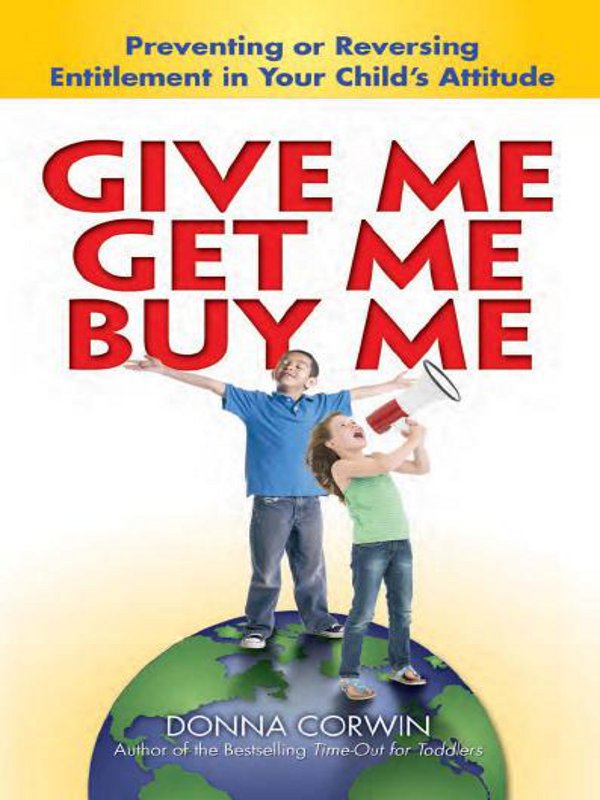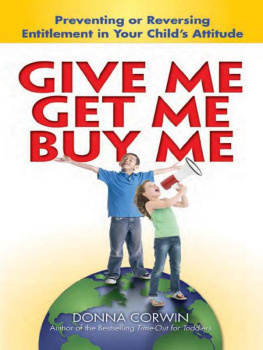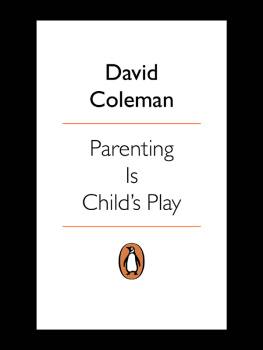
GIVE ME,
GET ME,
BUY ME!
GIVE ME,
GET ME,
BUY ME!
Preventing or Reversing
Entitlement in Your Childs Attitude
DONNA CORWIN

www.hcibooks.com
Library of Congress Cataloging-in-Publication Data
Corwin, Donna G.
Give me, get me, buy me! : preventing or reversing entitlement in your childs
attitude / Donna Corwin.
p. cm.
eISBN-13: 978-0-7573-9527-7 eISBN-10: 0-7573-9527-9
1. Pampered child syndrome. 2. Entitlement attitudes. 3. Child rearing.
4. Child psychology. I. Title.
HQ769.C457 2010
649'.7dc22
2009053210
2010 Donna Corwin
All rights reserved. Printed in the United States of America. No part of this publication may be reproduced, stored in a retrieval system, or transmitted in any form or by any means, electronic, mechanical, photocopying, recording, or otherwise, without the written permission of the publisher.
HCI, its logos, and marks are trademarks of Health Communications, Inc.
Publisher: Health Communications, Inc.
3201 S.W. 15th Street
Deerfield Beach, FL 334428190
Cover design by Larissa Hise Henoch
Interior design and formatting by Lawna Patterson Oldfield
AlexandraMy precious daughter,
my inspiration, my joy
StanMy husband,
my mentor, my believer
CONTENTS
Stan CorwinThank you for your insightful edits and invaluable comments. You always encourage me and push me forward.
Ann BenyaEight books and thousands of pages later, you are still the best at making sense of my scribble. Thank you.
Thank you to my friends and associates whose input and perspectives were so valuable in creating this book.
Michele MatriscianiMy editor and cheerleader, who believed in this book from the beginning. Thank you for your support and valuable guidance.
Thanks also to Carol Rosenberg and the editorial staff at HCI Books.
To the parents who openly shared their stories, fears, and feelings.
It is difficult to talk about entitlement without discussing the problems we have experienced financially as a nation. Lulled into apathy and spending sprees, a large majority of Americans have been seduced by credit cards, high-priced media ads, and Wall Street selling us and subsidizing the idea of the good life. It wasnt necessarily the message of reaching for the good life that has gotten us into the bind we are in now, but rather the mentality that anyone and everyone is entitled to the good life, never mind if the means are available to pay for it. The message was go aheadbuy and spend freely. We became intoxicated by things. You work hard, so you should reap the rewards by saying yes to your whims; you are entitled to that arent you? This financial de-empowerment message, whether fabricated or not, has been translated to our children. We spent what we didnt have, forgot to save for a rainy day, and competed fiercely to have the biggest and the best. The mantra Give Me, Get Me, Buy Me was subtly sold to us as parents by a society bent on having it all. Our children watched us hand over credit cards like they were candy. We bought everything they asked for without hesitation and set an example of overindulgence with no financial boundaries.
I fell into this entitlement trap. I raised an entitled child. She is wonderful, free-spirited, curious, intelligent, creative, and spoiled. When she and her friends are told, We cant afford that or Its too much money, a glazed look comes across their faces. Entitled children are not used to hearing these words. It is difficult to adjust to the real world where there are new financial boundaries.
Having been raised on the heels of the boomer generation, I spent money so freely and gave so easily that a reality check came when the bottom dropped out of the economy. The postboomers entitlement generation, those born between 1979 and 1994, were the recipients of free-spending parents. Their role models were parents who coveted things in a time when the competition race was at its height. We competed over whose child had the most toys, got the better grades, made the top private schools, had the top sports equipment. Then these post-boomers transferred their entitled attitudes to their children, truly believing the good times and money would never end.
We now have children who are unprepared for fiscal responsibility and have delusions of grandeur when it comes to emphasis on material things. The big house, big car, and big job may temporarily be out of our childrens grasp. They are more unaware of the outside world and what it means to save and to sacrifice.
As parents now struggle financially, there is more worry about paying bills than incurring them. Left with unsettling and unpredictable economic scenarios, parents are also left with entitled children, who have attitudes that clash with the money-conservative mindset they are forced to adopt. As hard as this time may be for many parents, in other ways, it is a chance to take hold of values that are really important in order to have a strong family unit in difficult times. This is the bright side we will be focusing on in Give Me, Get Me, BuyMe, with information on how to raise a child with a social conscience, who is also a self-sufficient, independent, and capable human being.
Entitled children are created, not born. I became a Give Me, Get Me, Buy Me parent early on. Not wanting to deprive my princess of anything, I indulged her until she started to get used to the good life. In fact, I trained her so well that, like Pavlovs dog, when we entered a shopping mall, she didnt start to salivate or bark, but she did whine incessantly. If I passed a shop without buying her something, passed the food court without getting her a cookie (even before dinner), or didnt run around like a crazy person to find her the same super, strappy, pink flip-flops that all of her friends had, she would torture me until I gave in. But secretly, I wanted to indulge her demands. I wanted her to be happy, to love her mommy who gave her everything. I was slowly creating a live, full-blown entitled beasta child whose voracious appetite for things, for getting her own way, and for lack of boundaries was out-of-control. I knew that something was terribly wrong but was stuck in the narcissistic pattern of giving in to her give me, get me, buy me demands.
Many well-meaning parents bow to the demands of their children early onnot wanting to upset the poor dears. There is a parental fear that not complying with a childs demands will create an angry, frustrated child. Parents fear losing favor with their children. The subliminal message is If I dont give, I am not a good enough parent. Parents fail to consider the bigger psychological problems that can occur when children lack discipline, boundaries, and humility.
When my child became a teen, the stakes got higher. Forget toys and pink sandals. Were now talking cars and Prada bags. But, with inner strength, a lot of support, and a desire to end the Give Me, Get Me, Buy Me madness, I started to change the entitled child attitude.
In our money-centered society, this has not been an easy task. Parents who I talk with about falling into the entitlement trap utter one overwhelming mantra: We want to take charge and begin to get control of our families.
Overindulgence is not just about material objects. When we are hesitant to say no to our children for fear that they will withdraw their love or have a tantrum, we are doing ourselves and them a terrible disservice. Children will have a difficult time when they go to school, begin a job, and try to have friendships if they do not have limits and boundaries. Entitled children will always want to come first, and that is not how the real world functions. They will always have a sense of frustration. Parents must take the reigns and monitor their childrens activities and not give in so readily to demands. It took me a while to realize the off button is in my handsnot my childsand in this book, I will help you to press this button.
Next page









